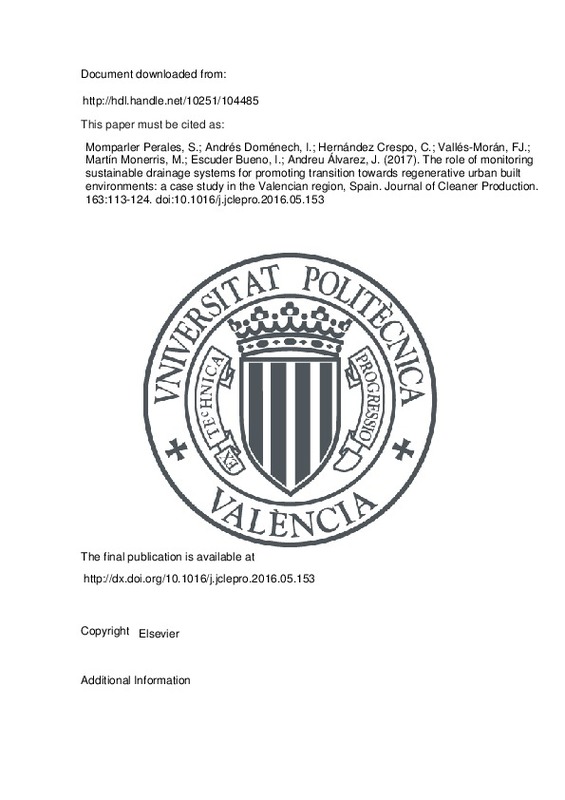JavaScript is disabled for your browser. Some features of this site may not work without it.
Buscar en RiuNet
Listar
Mi cuenta
Estadísticas
Ayuda RiuNet
Admin. UPV
The role of monitoring sustainable drainage systems for promoting transition towards regenerative urban built environments: a case study in the Valencian region, Spain
Mostrar el registro sencillo del ítem
Ficheros en el ítem
| dc.contributor.author | Momparler Perales, Sara
|
es_ES |
| dc.contributor.author | Andrés Doménech, Ignacio
|
es_ES |
| dc.contributor.author | Hernández Crespo, Carmen
|
es_ES |
| dc.contributor.author | Vallés-Morán, F. J.
|
es_ES |
| dc.contributor.author | Martín Monerris, Miguel
|
es_ES |
| dc.contributor.author | Escuder Bueno, Ignacio
|
es_ES |
| dc.contributor.author | Andreu Álvarez, Joaquín
|
es_ES |
| dc.date.accessioned | 2018-06-22T04:23:33Z | |
| dc.date.available | 2018-06-22T04:23:33Z | |
| dc.date.issued | 2017 | es_ES |
| dc.identifier.issn | 0959-6526 | es_ES |
| dc.identifier.uri | http://hdl.handle.net/10251/104485 | |
| dc.description.abstract | [EN] Sustainable drainage systems are an alternative and holistic approach to conventional urban stormwater management that use and enhance natural processes to mimic pre-development hydrology, adding a number of well-recognized, although not so often quantified benefits. However, transitions towards regenerative urban built environments that widely incorporate sustainable drainage systems are "per se" innovative journeys that encounter barriers which include the limited evidence on the performance of these systems which, in many countries, are still unknown to professionals and decision makers. A further important barrier is the frequently poor interaction among stakeholders; key items such as sustainable drainage systems provide collective benefits which also demand collective efforts. With the aim of overcoming such innovation-driven barriers, six showcase projects (including rain gardens acting as infiltration basins, swales and a green roof) to demonstrate the feasibility and suitability of sustainable drainage systems were developed and/or retrofitted in two cities of the Valencian region of Spain as a part of an European project, and their performance was monitored for a year. The data acquired, after being fully analyzed and presented to a group of key regional stakeholders, is proving to be a valuable promoter of the desired transition (for instance in influencing the support to SuDS in recent regional legislation). This paper presents detailed data on how these urban ecological drainage infrastructure elements reduce runoff (peak flows and volumes) and improve its quality, contributing to the goal of healthier and livable cities. The data show that the pilots have good hydraulic performance under a typical Mediterranean climate and also provided water quality benefits. Furthermore, it shows how engagement can contribute to smarter governance in the sense of smoothing the difficulties faced by innovation when being presented, understood, and endorsed by professionals and decision-makers in the field of stormwater management. Finally, activities undertaken in the demonstration sites monitored, show how they have been drivers of innovation and transition towards a new stormwater paradigm in Spain, serving as a reference to other urban areas in the Mediterranean. (C) 2016 Elsevier Ltd. All rights reserved. | es_ES |
| dc.description.sponsorship | This research has been conducted as part of the Life+ program project "AQUAVAL: Sustainable Urban Water Management Plans, promoting SUDS and considering climate change, in the province of Valencia" (Life08ENV/E/000099) and the MED program project "E2STORMED: Improvement of energy efficiency in the water cycle by the use of innovative stormwater management in smart Mediterranean cities" (1C-MED12-14), both supported by European Regional Development Fund (ERDF) funding of the European Union. | |
| dc.language | Inglés | es_ES |
| dc.publisher | Elsevier | es_ES |
| dc.relation.ispartof | Journal of Cleaner Production | es_ES |
| dc.rights | Reconocimiento - No comercial - Sin obra derivada (by-nc-nd) | es_ES |
| dc.subject | Built environment | es_ES |
| dc.subject | Mediterranean climate | es_ES |
| dc.subject | Monitoring | es_ES |
| dc.subject | Sustainable drainage systems | es_ES |
| dc.subject | Transitions | es_ES |
| dc.subject.classification | TECNOLOGIA DEL MEDIO AMBIENTE | es_ES |
| dc.subject.classification | INGENIERIA HIDRAULICA | es_ES |
| dc.title | The role of monitoring sustainable drainage systems for promoting transition towards regenerative urban built environments: a case study in the Valencian region, Spain | es_ES |
| dc.type | Artículo | es_ES |
| dc.identifier.doi | 10.1016/j.jclepro.2016.05.153 | es_ES |
| dc.relation.projectID | info:eu-repo/grantAgreement/EC//1C-MED12-14/EU//E2STORMED/ | es_ES |
| dc.rights.accessRights | Abierto | es_ES |
| dc.date.embargoEndDate | 2019-10-01 | es_ES |
| dc.contributor.affiliation | Universitat Politècnica de València. Departamento de Ingeniería Hidráulica y Medio Ambiente - Departament d'Enginyeria Hidràulica i Medi Ambient | es_ES |
| dc.description.bibliographicCitation | Momparler Perales, S.; Andrés Doménech, I.; Hernández Crespo, C.; Vallés-Morán, FJ.; Martín Monerris, M.; Escuder Bueno, I.; Andreu Álvarez, J. (2017). The role of monitoring sustainable drainage systems for promoting transition towards regenerative urban built environments: a case study in the Valencian region, Spain. Journal of Cleaner Production. 163:113-124. doi:10.1016/j.jclepro.2016.05.153 | es_ES |
| dc.description.accrualMethod | S | es_ES |
| dc.relation.publisherversion | http://dx.doi.org/10.1016/j.jclepro.2016.05.153 | es_ES |
| dc.description.upvformatpinicio | 113 | es_ES |
| dc.description.upvformatpfin | 124 | es_ES |
| dc.type.version | info:eu-repo/semantics/publishedVersion | es_ES |
| dc.description.volume | 163 | es_ES |
| dc.relation.pasarela | S\315959 | es_ES |
| dc.contributor.funder | Ajuntament de Xàtiva | es_ES |
| dc.contributor.funder | European Commission | es_ES |







![[Cerrado]](/themes/UPV/images/candado.png)

